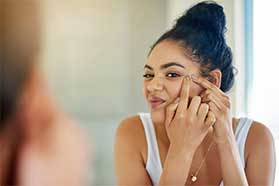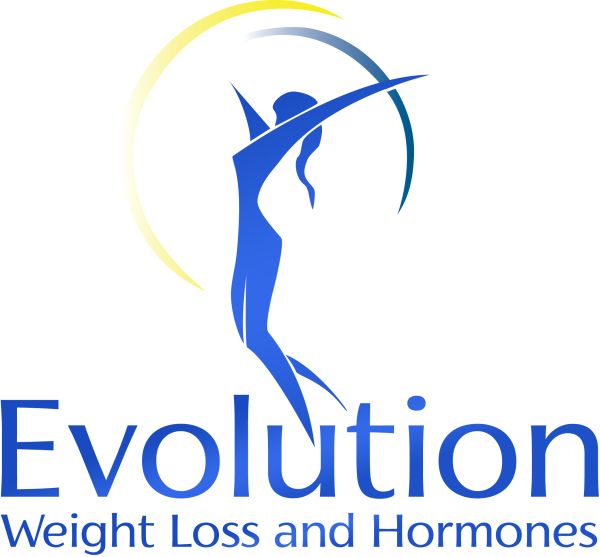Cystic Acne Treatment in Land O Lakes, FL

Cystic acne is a severe form of acne that causes the pores in your skin to become clogged with oil and dead skin cells, resulting in infection and inflammation. The pore then ruptures beneath the skin and inflammation spreads. Your immune system will react by forming a cyst around the inflamed, infected area to stop it from spreading further. The unique appearance of a cystic acne eruption occurs because of acute damage to the oil gland, causing intense irritation and inflammation, which presents as redness, swelling and soreness.
Cystic acne is often hereditary and triggered by hormonal changes during puberty, pregnancy, or menopause, causing eruptions on the jawline, neck and chin.
Cystic acne symptoms can normally be resolved with diet, medication, a particular hygiene regimen and certain lifestyle changes. Because cystic acne can lead to scarring that lasts a lifetime, it is important to see a healthcare provider in Land O Lakes who specializes in cystic acne treatment before your condition worsens. Call (813) 536-3212 or contact Erin Bolton online to schedule your appointment.
What Are the Causes of Cystic Acne?
The pores in your skin have oil glands, known as sebaceous glands because they secrete an oily substance known as sebum. In normal circumstances, this sebum protects hair follicles and your skin; however, when there is an overproduction of sebum and skin cells, your pores can become clogged, creating the perfect storm for overgrowth of bacteria and infection. The infected, clogged pore becomes inflamed, and a cyst develops around it to stop the spread of the infection and inflammation.
The stage for cystic acne can be set in the womb. If one or both of your parents had cystic acne, you are four times more likely to suffer with it yourself. However, the genetic link seems to be tied to sebum production, not necessarily acne severity.
Other causes of cystic acne include:
- Hormonal changes in men and women, including polycystic ovary syndrome in females
- Makeup and other cosmetic solutions, powders, oils and creams that may clog pores and irritate skin
- Drugs (e.g., corticosteroids, lithium, etc.) that cause eruptions similar to cystic acne
- High-temperature humidity which causes you to perspire excessively
- Ingrown hairs
- Allergies (including food allergies)
- Poor dietary habits
Cystic acne is most often seen in teenage boys and young adult men. An increase in male androgen leads to changes in their skin that results in acne and clogged pores. In girls and women, hormonal changes linked to cystic acne can be triggered by menstrual cycles, menopause or pregnancy.
What Are Cystic Acne Symptoms?
The most common symptoms of cystic acne include:
- Lesions under the skin that can often be felt but not seen
- Large, red, painful, raised eruptions on the face, chest, back, upper arms, shoulders, thighs and buttocks
- Nodules that do not have a whitehead showing
- Painful breakouts
- An increase in cysts and nodules and more visible inflamed acne
- Increasing psychological distress, decreased self-esteem and anxious or depressed mood
- A hormone-triggered breakout pattern along the jaw, chin and neck
How Do You Treat Cystic Acne?
In order to properly treat cystic acne, it is important to identify what is triggering your cystic acne and address this root cause. This may result in dietary changes, certain vitamins or even hormone therapy to address a hormonal imbalance.
Common medical treatments for cystic acne include steroid injections, isotretinoin (commonly known as Accutane), oral antibiotics and birth control pills (to regulate female hormones). There are many prescription creams and ointments as well that your healthcare provider may recommend.
In addition to these pharmaceutical therapies, your healthcare provider may recommend one or several of the following cystic acne home remedies:
- Ice inflamed areas to reduce redness and swelling.
- Avoid popping cystic acne eruptions as these are usually not poppable and the damage you cause will delay healing and cause scarring. You are also spreading the infection beneath the skin which will cause additional eruptions.
- Avoid irritants by choosing unscented cosmetic products, moisturizers and detergents.
- Keep your skin clean but do not scrub cystic acne.
- Exfoliate gently with gentle products containing glycolic acid or fruit enzymes.
- Regularly change your bedding and towels to prevent the spread of bacteria.
- Practice activities which lower your stress levels like yoga or mediation, as stress can exacerbate symptoms.
- Get more sleep and regular exercise.
The Cystic Acne Diet
Eating to control cystic acne means adding healthy foods to your diet, but the first step is to cut out foods that trigger breakouts. Common foods to avoid include:
- Conventional dairy
- Sugar
- Caffeine and chocolate (because they impact hormones)
- Processed convenience or junk foods
- Fried foods and fast food because they typically trigger an inflammation response
It is important to eat certain foods to control inflammation, improve immune response and speed healing. Try to include the following foods in your diet:
- Fresh fruits and vegetables
- Nuts, seeds, beans and legumes
- Fermented foods like organic yogurt, kombucha or sauerkraut
- High-zinc foods
- Fiber
- Grass-fed meats, wild-caught fish rich in omega-3 fatty acids and free-range eggs
- Foods that support your liver
Helpful supplements to prevent or speed healing of cystic acne eruptions include probiotics , omega-3 fish oil and zinc . You should only modify your diet and take dietary supplements under the guidance of your healthcare provider.
Request more information about the cystic acne and your prevention and treatment options today. Call (813) 536-3212 or contact Erin Bolton online.
Evolution
Address
4691 Van Dyke RoadLutz, FL 33558
(813) 536-3212
www.evolution4health.com
Hours
Mon:
10:00 am - 4:00 pm
Tue:
10:00 am - 4:00 pm
Wed:
10:00 am - 5:00 pm
Thu:
10:00 am - 6:00 pm
Fri:
10:00 am - 3:00 pm
Sat:
Closed
Sun:
Closed


